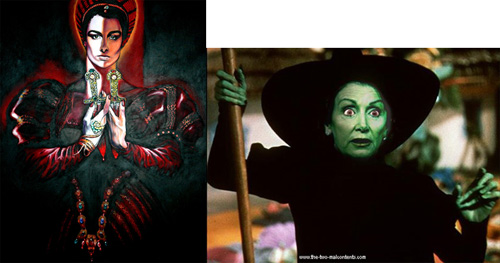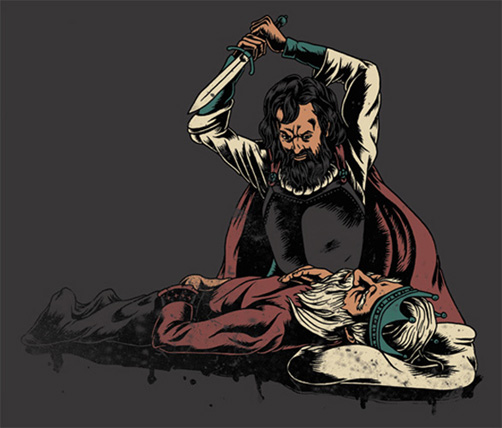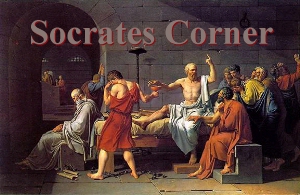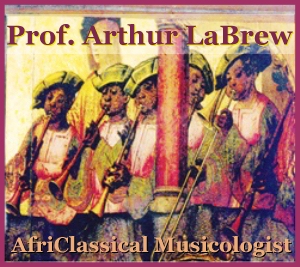Lady Macbeth, or Lady MacClinton–which is the real witch?
“Come, you spirits that tend on mortal thoughts, unsex me here,
and fill me from the crown to the toe top-full of direst cruelty. Make thick my blood.”
~ Lady Macbeth
“No. We just can’t trust the American people to make those types of choices … Government has to make those choices for people.”
~ Hillary Clinton

Lady Macbeth and Hillary Clinton in their true forms
Act 1
The fictional classic by William Shakespeare begins when Scotland is ruled under the leadership of King Duncan, who has just repelled an oncoming invasion by a Norwegian army. A sergeant reports to Duncan that Macbeth has heroically slain the rebel Macdonwald. At the same time he reports how the Thane of Cawdor has betrayed the country (Thanes were feudal lords). Duncan sentences Cawdor to death for this treason and passes on his title to Macbeth. Banquo, another general under Duncan, and Macbeth leave the battlefield and journey to King Duncan’s castle. On the way to the castle they pass by a heath on which three Witches (called the Weird Sisters) are involved in some eerie rituals and chants. They appraise Macbeth shouting, “Thane of Glamis! Thane of Cawdor! That shalt be King hereafter.” They predict that Banquo’s heirs, not Banquo, will also be kings. Macbeth, already the Thane of Glamis, is startled when they proclaim him Thane of Cawdor at Duncan’s castle, and disturbed by the fulfillment of the prophecy and his latent ambition that he has desired to become king.
Despite Macbeth’s heroic victory, Duncan decides to appoint his son, Malcolm, to become the Prince of Cumberland. Macbeth viewed this as an obstacle toward the three witches’ prophecy. Fearing Macbeth’s kindness will keep him from the throne, Macbeth’s wicked wife, Lady Macbeth, beckons a group of evil spirits to help murder King Duncan so Macbeth can seize the throne. She sees an opportunity when Duncan plans to spend the night at Macbeth’s residence. When King Duncan arrives, Lady Macbeth welcomes him to a banquet in his honor, secretly plotting his own demise. Troubled by his conscience, Macbeth goes off alone and performs a soliloquy (a long speech to oneself), to which he recounts his conflict between his “vaulting ambition” and his sense of honor. Lady Macbeth then taunts Macbeth for his lack of manliness and suggests that he kills Duncan with her crafted plot. Inspired by his wife’s determination, he agrees. Lady Macbeth gets the guards drunk and steals their daggers to give to Macbeth.
Act 2
When the midnight bell rings, Macbeth journeys to Duncan’s chamber, strangely perceiving the hallucination of a dagger as he grows closer to the room. Macbeth enters the room, leaving Lady Macbeth to remain outside in her own twisted excitement at the anticipation of the murder. Soon Macbeth returns outside holding two bloody daggers, visible shaken from his actions. Macbeth is horrified by what he has done and shocked when he hears a mysterious voices saying, “Macbeth does murder sleep… Macbeth shall sleep no more.” Suggesting to hide their involvement of the murders, Lady Macbeth smears blood on the guards hands and Duncan’s face, making it look like the guards stabbed Duncan and Duncan retaliated by stabbing both the guards.
A few minutes later two Scottish generals, Lennox and Macduff enter the castle with news for King Duncan. While Lennox describes the strange news in the night, Macduff returns horrified to reveal that Duncan has been murdered. Macbeth pretending to be skeptic, dashes to the scene and proclaims that he killed the guards that murdered Duncan. Lady Macbeth faints. Duncan’s two sons, Malcolm and Donalbain, fear the same fate for themselves and flee the country, one to Ireland, another to England. Outside, an old man describes some strange occurrences of the night which he believes are evil omens, warning signs of the future, explaining it to Ross, a nobleman, including: the day suddenly turning to night, a falcon being killed by an owl, and Duncan’s horses ran wild and ate each other. Macbeth is crowned king, making Macduff feel uneasy as he doesn’t like or trust him, and chooses to not attend his coronation. Banquo secretly knows that Macbeth murdered Duncan.

Treacherous Macbeth murders King Duncan
Act 3
At the royal palace in Forres, where Macbeth resides as king, Banquo in a soliloquy reveals his intuition that Macbeth has murdered Duncan. Soon Macbeth and his royal court enter the room and invites Banquo to be his guest of honor at his big banquet celebration that evening. When he agrees, Macbeth later confesses in a soliloquy his fear and jealousy of Banquo in that he is unafraid of Macbeth’s power and is wise enough to understand what has truly happened to Duncan.
Macbeth hires two assassins to murder Banquo as he is out horse riding with his son, Fleance. They intercept Banquo and his son on the road and slay Banquo, allowing Fleance to escape. When one of the assassin’s comes to Macbeth’s door with blood on his face, Macbeth runs out of his seat to hear the report of Banquo’s death. After hearing of Banquo’s death Macbeth returns to his seat, but as he glances across the room he suddenly sees a blood covered Ghost of Banquo appear in a nearby seat, which causes Macbeth to scream in horror. But no one else sees the ghost. After repeated instances of the ghost reappearing and disappearing to Macbeth’s perception, Lady Macbeth is forced to dismiss all the party guests, and scolds Macbeth for his fearful outbursts. Macbeth warns her that he has too much blood on his conscious, too much to live in peace. Macbeth is also suspicious of Macduff’s refusal to attend his ceremony. Elsewhere, Lennox and another lord discuss Macbeth’s tyranny, and reveal that Malcolm is being protected by King Edward in England. Macduff has traveled to England as well, in hopes of rallying aid to free Scotland from Macbeth’s oppression.
Act 4
Macbeth, now completely governed by evil intentions, seeks the three Witches for counsel. The Witches conjure up three apparitions. The first is an armed head, which warns Macbeth to beware Macduff. Second is a bloody child who tells Macbeth, “none of a woman born/ Shall harm Macbeth” (meaning Macbeth cannot be harmed by anyone born by a woman). The third is a child wearing a crown holding a tree in his hand reveals that Macbeth will never be defeated unless the Birnam Wood comes to Dunsinane Hill (the location of Macbeth’s castle).
Lastly the witches conjure up a parade of eight ghostly kings along with Banquo’s ghost whom points to them as his future descendants and heirs. When word arrives that Macduff has fled to England, Macbeth is enraged by his defection and orders a group of soldiers to seize Macduff’s castle and assassinate his wife and children. Soon, Ross informs Macduff that his wife and children have been mercilessly slaughtered by Macbeth’s soldiers. Macduff vows to return to Scotland leading the forces raised by Malcolm to conquer Macbeth personally.
Act 5
At Dusinane, an insane Lady Macbeth sleepwalks and later speaks in her sleep that Banquo’s ghost cannot arise from the grave. Elsewhere near Dusinane, Scottish lords and soldiers set out to rendezvous with Macduff and the English forces at Birnam Wood. Inside the castle, a servant warns Macbeth that 10,000 soldiers are approaching the area. At Birnam Wood, the Scottish army is united with English forces led by Malcolm who all shield themselves using tree branches as camouflage. At Dusinane, Macbeth prepares for battle. Suddenly an astonished woman announces that Lady Macbeth has committed suicide by jumping out of a castle window.
Macbeth suddenly realizes the futility of his situation and bitterly reflects on the senselessness of his life in a soliloquy. When a messenger reveals that Birnam Wood (the camouflaged soldiers) appears to be moving closer to Dusinane, Macbeth then understands the meaning behind the cryptic prophecy. The assault on the castle begins, and although victory seems unlikely, Macbeth gives a call to arms for battle; he refuses to commit suicide as an escape. Soon Macbeth is confronted by Macduff. Macbeth hesitates to attack stating, “My soul is too much charged/ With blood of thine already.” Macbeth warns Macduff that he cannot be killed by one who is born by a mother. But Macduff reveals that he was “untimely ripped” out of his mother’s womb and an intense sword fight to the death ensues between the two. In the end Macduff slays Macbeth and decapitates him, displaying his lifeless head in victory before the Scottish lords, hailing the tyrant dead and Malcolm the new king.
Message for our Modern Day
The classic Shakespearian tragedy Macbeth reveals many critical parallels to key individuals in modern day. I was largely inspired to write this article after reading my father, Professor Ellis Washington’s opus on Macbeth. Macbeth mirrors previous President Bill Clinton in many ways. Despite attaining Presidency through legal methods unlike Macbeth’s seizure of the throne through assassination, President Bill Clinton was no doubt a radical leader, being the most prominent “New Democrat” of his time increasing tax rates and imposing more regulations than the previous liberal Democrats. Although President Clinton did not run the nation in the self-destructive pattern that the tyrannical Macbeth had, his scandalous activity and his incompetence in refusing to take responsibility for his lawlessness led to his inevitable impeachment. This Watergate-type scandal was skillfully chronicled in an outstanding opus by Professor Richard A. Posner, former Chief Judge of the Seventh Court of Appeals and Senior Lecturer at University of Chicago School of Law, titled An Affair of State: The Investigation, Impeachment, and Trial of President Clinton (Harvard University Press, 1998).
Nevertheless, many readers perhaps overlook the cultivator of corruption behind the rise of Clinton treachery in America: former Secretary of State under President Barack Obama, Hillary Clinton, who I refer to in this opus as “Lady MacClinton.” Similar to Lady Macbeth, Lady MacClinton secretly enabled her husband to be in a state of unrivaled power so she could thrive vicariously (from the shadows) for the power, money and control she lusted after since she was unceremoniously fired from the Watergate investigation in 1974 for lies and unethical behavior against President Nixon.
Lady MacClinton no doubt utilized her husband’s fame in office to propel herself to becoming Secretary of State under Obama and remained married to Clinton despite his affair with Monica Lewinsky presumably because she sought to grow in prestige by remaining married to Bill, (an existential fame and fortune she would surely lose absent this marriage of convenience). Evidence of this is seen when her public approval ratings grew 70 % in the wake of Bill Clinton’s violations in office, likely the recognition Lady MacClinton sought to take advantage of from the incident.
Lady MacClinton is assuredly the Lady Macbeth of today through all of her scandalous actions and lawless overreach coupled with the fact that she has escaped punishment time and time again through hiding behind the reputation of the infamous Clinton name. Like the witch that Lady Macbeth was, Lady MacClinton remains brazen, arrogant, and shameless despite all the blood on her hands, being responsible for the deaths of the four American officials during the2012 Benghazi Libya attack. The proud warrior, Macduff represents U.S Representative Trey Gowdy, who is currently battling to end the tyranny of the Clintons by leading the House Select Committee on the Benghazi cover-up.
Similar to how the terror of Macduff’s large camouflaged army surrounded Macbeth’s castle, Lady MacClinton is surrounded by the web of illegal activity found within her hundreds of incriminating emails and the threat of an FBI indictment leading to imprisonment charges. Perhaps as Lady Macbeth committed suicide when defeat was eminent, Lady MacClinton will finally be forced to commit political suicide by finding no escape from the pending allegations behind her recent scandals and accept a much deserved punishment.
Banquo and his ghost sadly represent the fallen victims of the Benghazi terrorist attack. Similar to how Lady Macbeth was seemingly unaffected by Banquo’s ghost at first, Lady MacClinton appeared unchallenged by any opposition to her responsibility for the death of the four Americans in Benghazi until Rep. Trey Gowdy (R-SC) disallowed the truth to be denied any longer, similar to how later in the story, Lady Macbeth could no longer hide her fear of the men she was responsible for killing.
America, we must not allow ourselves to accept such blatant disregard for the rule of law and constitutional principles by Lady MacClinton’s wanton, wicked behavior. How can one allow a woman to even think about running for President of the U.S. who is responsible for the transfer of 20 percent of U.S uranium (a major chemical used to build nuclear weapons) to the Russian government, a prime suspect in nuclear warfare and a long standing rival to U.S interests? This treachery alone is worse than all the other numerous offenses including, enabling the IRS harassment of Conservative organizations during the Clinton Presidency, refusing to use government protected email server by hiding her activity instead, along with the Bill, Hillary, and Chelsea Clinton Foundation accepting $30,000 between April 2005 and March 2006 and another contribution of between $25,000 and $50,000 in 2008 from the New York-based Alavi Foundation, which U.S. government prosecutors have identified as an arm of the Iranian government which is currently a major benefactor of Islamic terrorist organizations and nuclear armaments schemes all over the world.
All these heinous actions and many more were perpetuated while she was Bill Clinton’s “co-President” and Secretary of State. So America I pose the ultimate question: Lady Macbeth, or Lady MacClinton – which one is the real witch?
This essay is based in part on a synopsis of Shakespeare’s tragedy, Macbeth contained in, Dr. W. John Campbell, Book of Great Books: A Guide to 100 World Classics (Fall River, 2000), pp. 494-502
© Stone Washington
Category: Commentary, Socrates Corner






